Related Research Articles

Howard Andrew Williams was an American singer. He recorded 43 albums in his career, of which 15 have been gold certified and three platinum certified. He was also nominated for six Grammy Awards. He hosted The Andy Williams Show, a television variety show, from 1962 to 1971, along with numerous TV specials. The Andy Williams Show won three Emmy awards. The Moon River Theatre in Branson, Missouri, is named after the song for which he is best known—Johnny Mercer and Henry Mancini's "Moon River". He sold more than 45 million records worldwide, including more than 10 million certified units in the United States.
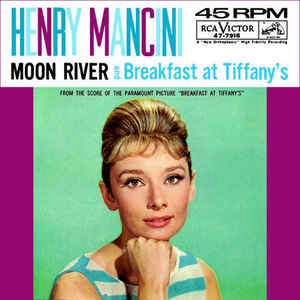
"Moon River" is a song composed by Henry Mancini with lyrics by Johnny Mercer. It was originally performed by Audrey Hepburn in the 1961 movie Breakfast at Tiffany's, winning an Academy Award for Best Original Song. The song also won the 1962 Grammy Awards for Record of the Year and Song of the Year.
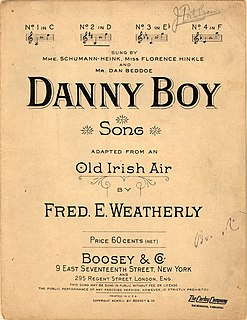
"Danny Boy" is a ballad, written by English songwriter Frederic Weatherly in 1913, and set to the traditional Irish melody of "Londonderry Air".
"Canadian Sunset" is a popular song with music by jazz pianist Eddie Heywood and lyrics by Norman Gimbel. An instrumental version by Heywood and Hugo Winterhalter reached No. 2 on the Billboard Hot 100 chart and No. 7 on the R&B chart in 1956. A version sung by Andy Williams was also popular that year, reaching No. 7 on the Billboard chart. The Sounds Orchestral, conducted by Johnny Pearson, hit the Easy Listening chart reaching No. 14 and the Billboard Hot 100 in 1965 reaching No. 76.
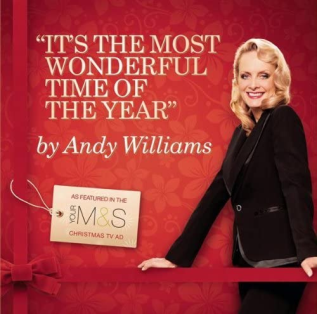
"It's the Most Wonderful Time of the Year" is a popular Christmas song written in triple time in 1963 by Edward Pola and George Wyle. It was recorded and released that year by pop singer Andy Williams for his first Christmas album, The Andy Williams Christmas Album. However, the song was not released as a promotional single by Williams' record label that year, as they instead opted to promote his cover of "White Christmas" as the official promo single from the album. The song peaked number 21 on the UK Singles Chart in 2007 and into the Top 10 consistently over the past several years, peaking at #5 in 2020 on the Billboard Hot 100 singles chart in the USA.

The Andy Williams Christmas Album is the first Christmas holiday album released by singer Andy Williams and his twelfth studio album overall. It was issued by Columbia Records in 1963, and it would prove to be the first of eight Christmas albums released by Williams. Though it was also the album that introduced Williams' perennial holiday classic "It's the Most Wonderful Time of the Year", Columbia instead opted to release Williams' cover of "White Christmas" as the album's promotional single at the time.

Danny Boy and Other Songs I Love to Sing is the eighth studio album by American pop singer Andy Williams and was released early in 1962 by Columbia Records. This was his first project after leaving Cadence Records, where his albums each had a specific theme, and his first in a series of LPs that covered songs established on stage and screen and other hits from the pop chart and the Great American Songbook. This trend would not be interrupted until his 1966 album The Shadow of Your Smile hinted at a shift toward contemporary material with its inclusion of songs first recorded by the Beatles.
Moon River and Other Great Movie Themes is the ninth studio album by American pop singer Andy Williams and was released on March 26, 1962 by Columbia Records and covered film songs that were mostly from the previous decade.
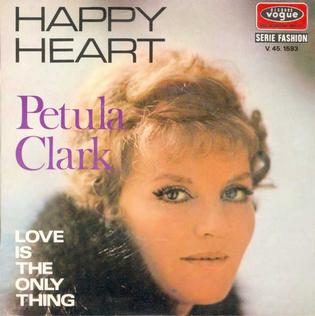
"Happy Heart" is a song written by James Last and Jackie Rae. Versions of the song by Petula Clark and Andy Williams charted simultaneously in 1969 and had their best showings on Billboard magazine's Easy Listening chart, where Clark peaked at number 12 and Williams spent two weeks at number 1.

The Wonderful World of Andy Williams is the thirteenth studio album by American pop singer Andy Williams and was released by Columbia Records to coincide with the December 31, 1963, broadcast of The Andy Williams Show. Various tracks were recorded with members of his family, including The Williams Brothers, who joined him for a remake of his first top 10 hit, "Canadian Sunset", from 1956.

Andy Williams' Greatest Hits Vol. 2 is a compilation album by American pop singer Andy Williams that was released in the UK in 1972 by the CBS Records division of Columbia. The US album that shares this title was released in June 1973 by Columbia Records but had only three of its 11 tracks in common with those on this album and used a different cover photo and design.
"Lonely Street" is a 1956 song written by Carl Belew, Kenny Sowder, and W.S. Stevenson, originally performed by Belew, and later by Dave Rich. Its most successful rendition was by Andy Williams, whose version reached #5 on the Billboard chart and #20 on the R&B chart in 1959. The song appeared on his 1959 album, Lonely Street. Archie Bleyer's Orchestra played on the song.
"The Village of St. Bernadette" is a song written by Australian singer Eula Parker, Parker received the 1959 Ivor Novello award for Best Song Musically and Lyrically.
"Hopeless" is a song written by Alan Jeffreys and Doc Pomus and performed by Andy Williams. The song reached #3 on the U.S. adult contemporary chart and #13 on the Billboard chart in 1963. The song's B-side, "The Peking Theme ", reached #115 on the Billboard Hot 100.
"A Fool Never Learns" is a song written by Sonny Curtis and performed by Andy Williams. The song reached #4 on the U.S. adult contemporary chart, #13 on the Billboard chart, and #40 in the UK in 1964. The song's A-side, "Charade", reached #100 on the Billboard Hot 100.
"Almost There" is a song written by Gloria Shayne and Jack Keller and performed by Andy Williams in his film I'd Rather Be Rich (1964). The song reached #12 on the U.S. adult contemporary chart and #67 on the Billboard chart in 1964. It also reached #2 in the UK in October 1965 for three weeks. The A-side, "On the Street Where You Live", was also a hit, reaching #3 on the adult contemporary chart and #28 on the Billboard Hot 100.
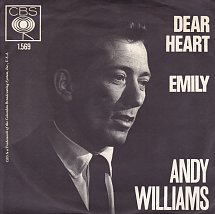
"Dear Heart" is a song written by Henry Mancini, Ray Evans, and Jay Livingston and performed by Andy Williams. It appears on the 1965 Andy Williams album, Andy Williams' Dear Heart. The song was the theme to the 1964 movie Dear Heart. It was nominated for the Academy Award for Best Original Song and also nominated for best song at the 22nd Golden Globe Awards.
"May Each Day" is a song written by George Wyle and Mort Green and performed by Andy Williams. The song reached #19 in the UK in 1966. The song originally appeared on his 1963 album Days of Wine and Roses and Other TV Requests.
"Holly" is a song written by Craig Smith and performed by Andy Williams. The song reached #4 on the adult contemporary chart and #113 on the Billboard chart in 1967.
"What Am I Living For" is a song written by Fred Jay and Art Harris and performed by Chuck Willis featuring the Reggie Obrecht Orchestra and Chorus. It reached No. 1 on the U.S. R&B chart and #9 on the U.S. pop chart in 1958.
References
- ↑ Andy Williams, "Fly by Night" chart positions Retrieved June 7, 2013
- ↑ Andy Williams, "Danny Boy" chart positions Retrieved June 7, 2013